Unit 4 I used to be afraid of the dark-Section A (3a-4c)课件(共53张PPT)
文档属性
| 名称 | Unit 4 I used to be afraid of the dark-Section A (3a-4c)课件(共53张PPT) |
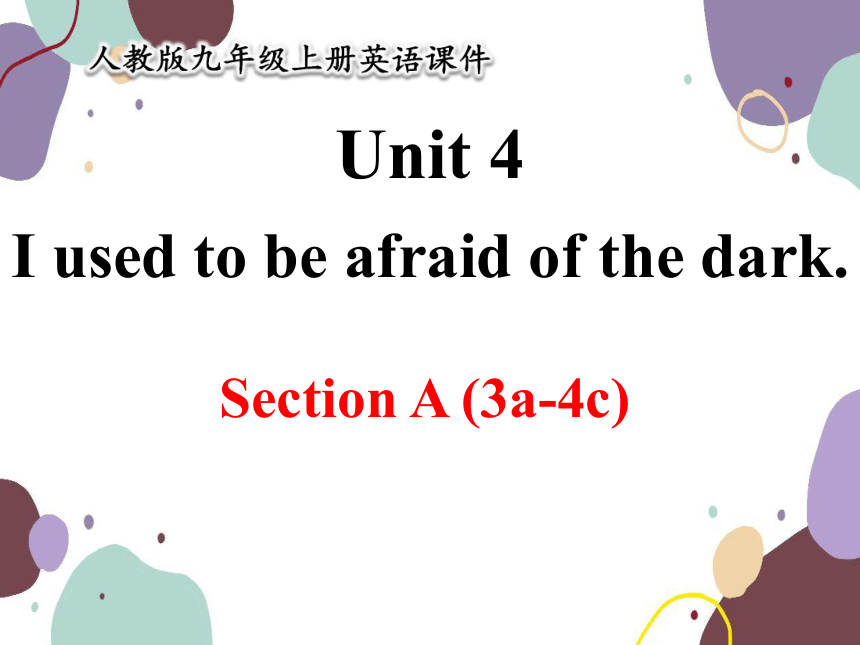
|
|
| 格式 | pptx | ||
| 文件大小 | 23.3MB | ||
| 资源类型 | 教案 | ||
| 版本资源 | 人教新目标(Go for it)版 | ||
| 科目 | 英语 | ||
| 更新时间 | 2023-07-21 00:00:00 | ||
图片预览

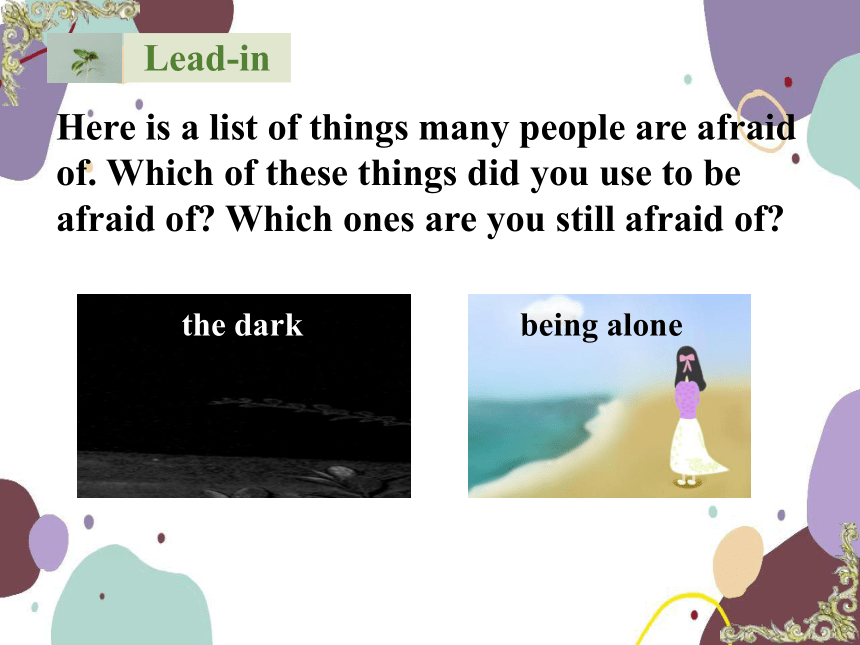

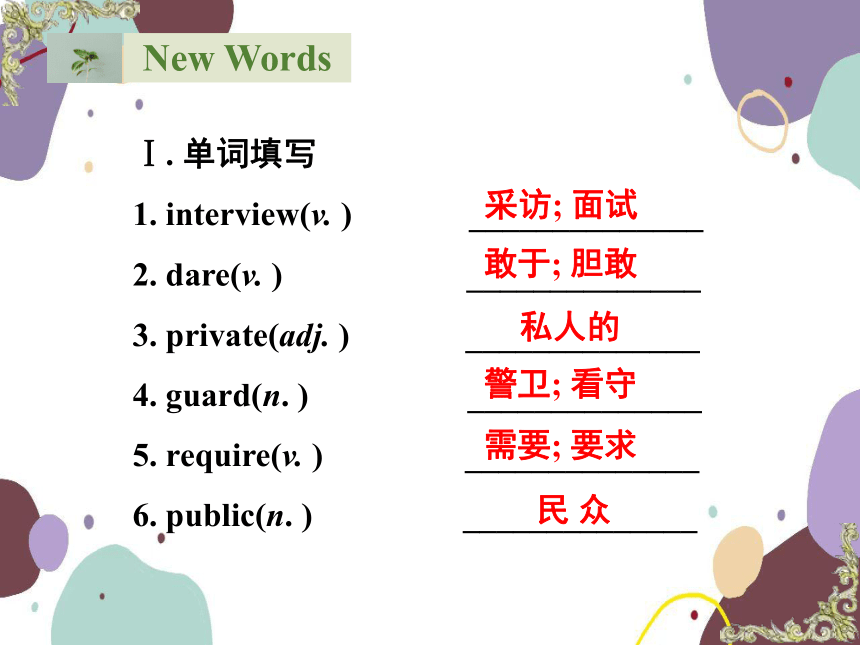
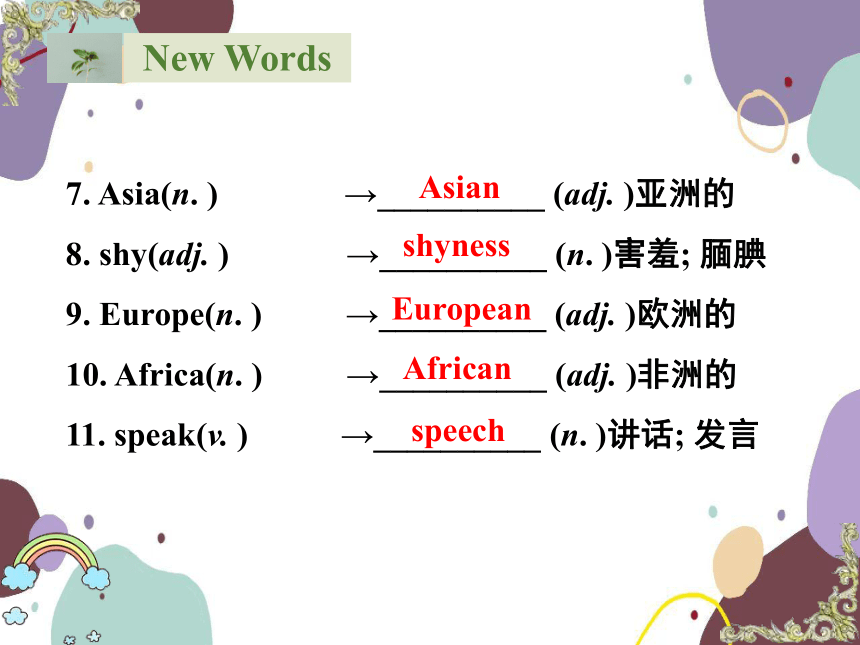
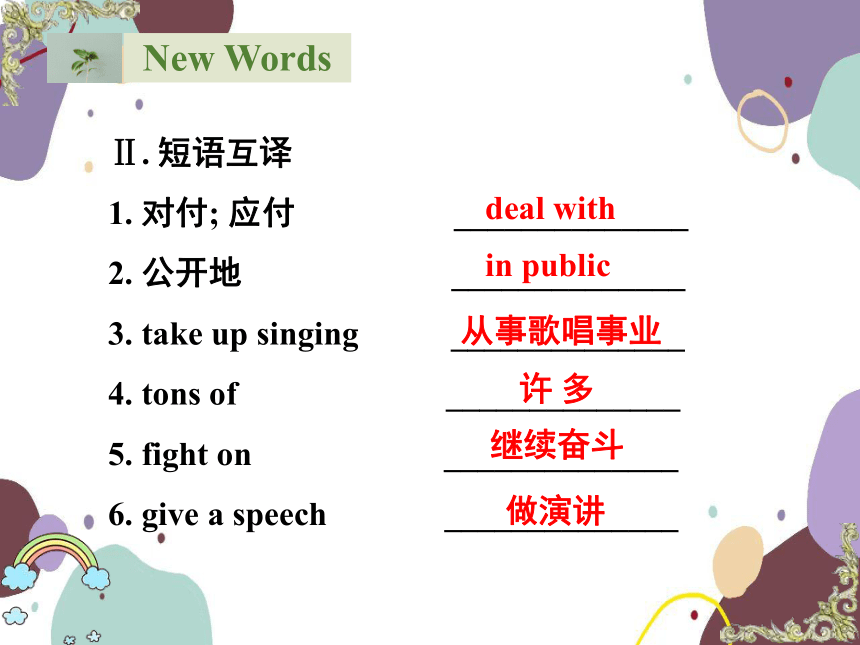
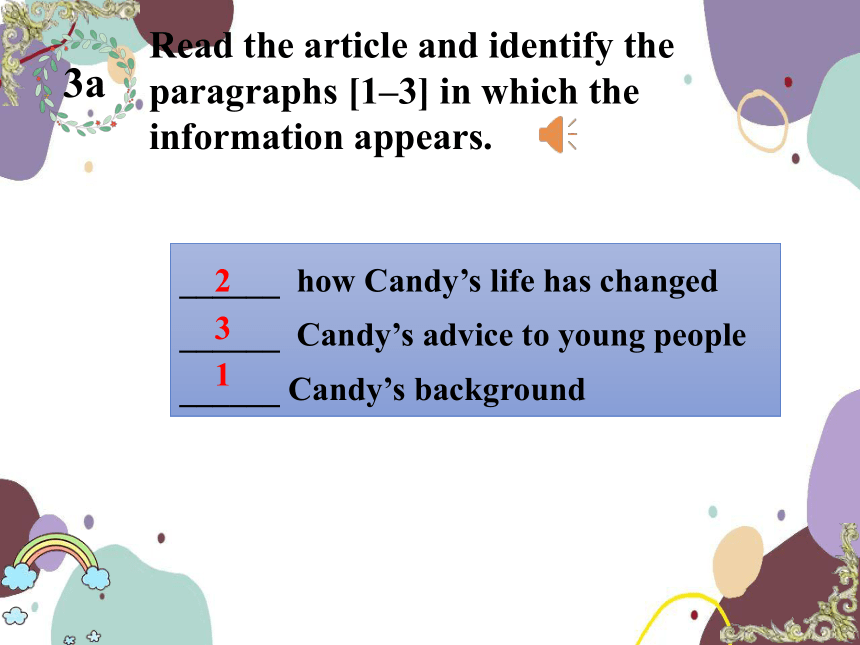
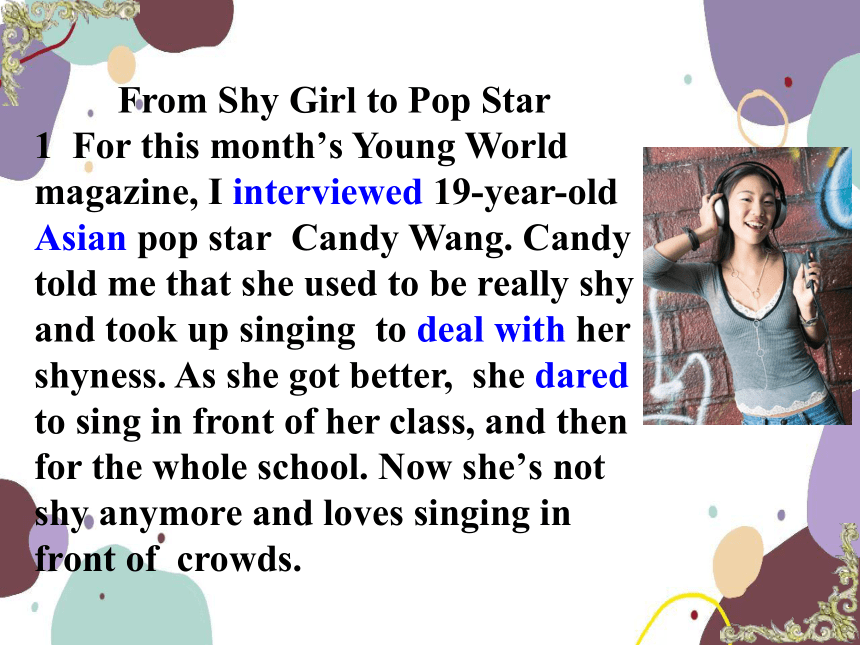
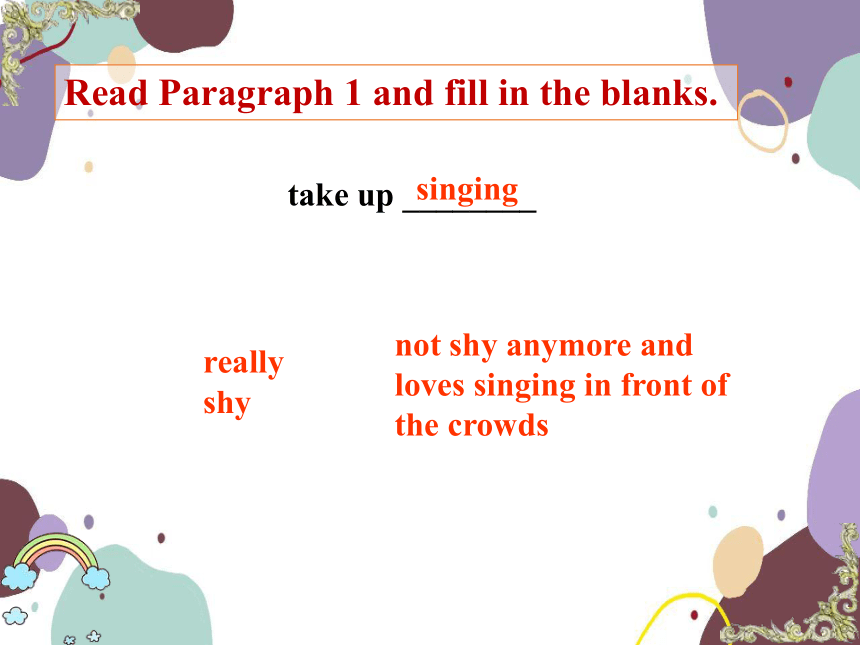
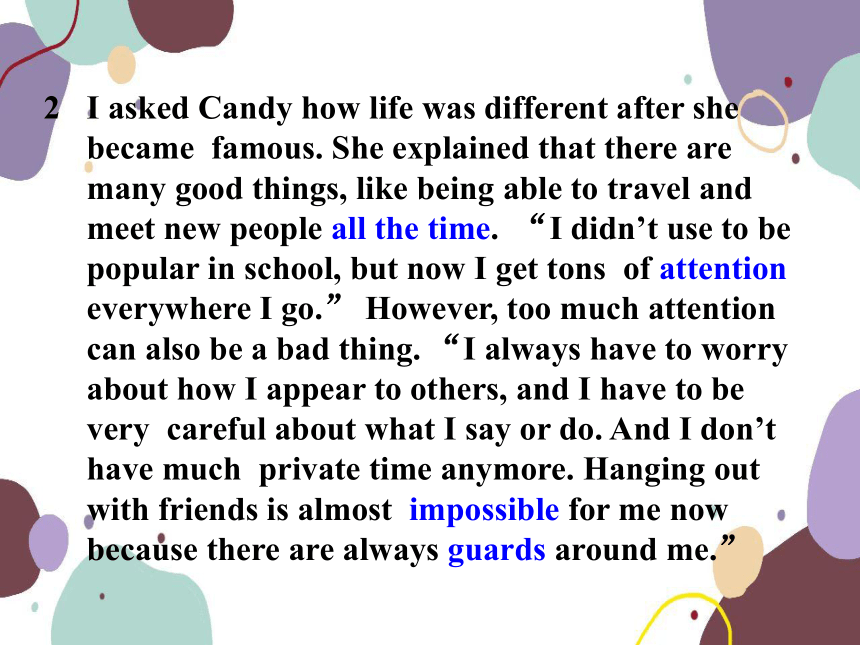
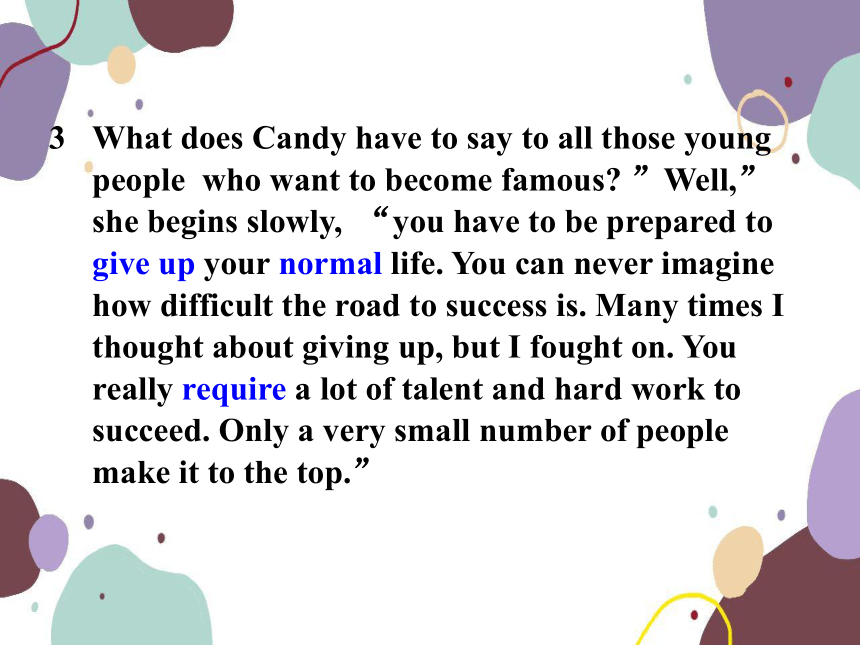
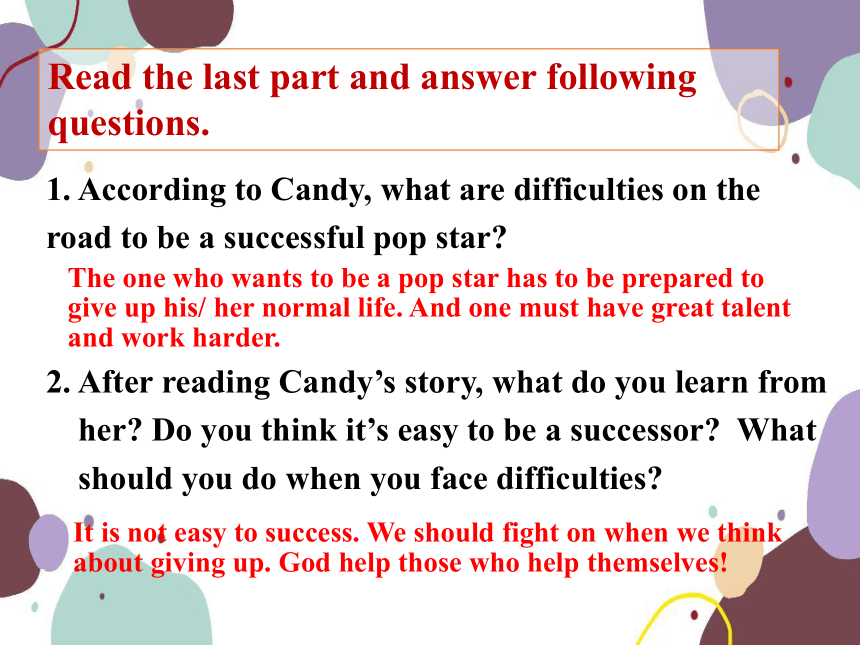
文档简介
(共53张PPT)
人教版九年级上册英语课件
Section A (3a-4c)
Unit 4
I used to be afraid of the dark.
Lead-in
Here is a list of things many people are afraid of. Which of these things did you use to be afraid of Which ones are you still afraid of
the dark
being alone
snakes
high places
New Words
Ⅰ. 单词填写
1. interview(v. ) ______________
2. dare(v. ) ______________
3. private(adj. ) ______________
4. guard(n. ) ______________
5. require(v. ) ______________
6. public(n. ) ______________
采访; 面试
敢于; 胆敢
私人的
警卫; 看守
需要; 要求
民 众
New Words
7. Asia(n. ) →__________ (adj. )亚洲的
8. shy(adj. ) →__________ (n. )害羞; 腼腆
9. Europe(n. ) →__________ (adj. )欧洲的
10. Africa(n. ) →__________ (adj. )非洲的
11. speak(v. ) →__________ (n. )讲话; 发言
Asian
shyness
European
African
speech
Ⅱ. 短语互译
1. 对付; 应付 ______________
2. 公开地 ______________
3. take up singing ______________
4. tons of ______________
5. fight on ______________
6. give a speech ______________
deal with
in public
从事歌唱事业
许 多
继续奋斗
做演讲
New Words
3a
Read the article and identify the paragraphs [1–3] in which the information appears.
______ how Candy’s life has changed
______ Candy’s advice to young people
______ Candy’s background
3
2
1
From Shy Girl to Pop Star
For this month’s Young World magazine, I interviewed 19-year-old Asian pop star Candy Wang. Candy told me that she used to be really shy and took up singing to deal with her shyness. As she got better, she dared to sing in front of her class, and then for the whole school. Now she’s not shy anymore and loves singing in front of crowds.
really shy
not shy anymore and loves singing in front of the crowds
take up ________
singing
Read Paragraph 1 and fill in the blanks.
I asked Candy how life was different after she became famous. She explained that there are many good things, like being able to travel and meet new people all the time. “I didn’t use to be popular in school, but now I get tons of attention everywhere I go.” However, too much attention can also be a bad thing. “I always have to worry about how I appear to others, and I have to be very careful about what I say or do. And I don’t have much private time anymore. Hanging out with friends is almost impossible for me now because there are always guards around me.”
What does Candy have to say to all those young people who want to become famous ”Well,” she begins slowly, “you have to be prepared to give up your normal life. You can never imagine how difficult the road to success is. Many times I thought about giving up, but I fought on. You really require a lot of talent and hard work to succeed. Only a very small number of people make it to the top.”
Read the last part and answer following questions.
1. According to Candy, what are difficulties on the road to be a successful pop star
2. After reading Candy’s story, what do you learn from her Do you think it’s easy to be a successor What should you do when you face difficulties
The one who wants to be a pop star has to be prepared to give up his/ her normal life. And one must have great talent and work harder.
It is not easy to success. We should fight on when we think about giving up. God help those who help themselves!
1. Candy told me that she used to be really shy and took up singing to deal with her shyness.
(1)take up 此处意为“开始从事”
He dropped medicine and took up physics.
他放弃医学,开始学物理。
take up的其他用法:
1)“占用” The table takes up too much room.
2)“继续” We took up our journey the next day.
Grammar
(2)deal with 相当于do with, 意为“对付;处理
deal with与do with的异同
I don’t know how they deal with the problem. = I don’t know what they do with the problem.
我不知道他们如何处理这个问题。
deal with 常与how连用, 强调处理问题的方式、方法
do with 常与what连用, 侧重于对某事物的利用
Grammar
2) 动词不定式短语 to deal with 后必须带宾语。
I don’t know how to deal with it.
我不知道如何处理这件事。
3) shyness 名词,意为“害羞;腼腆”是形容词shy加后缀-ness 构成的名词。
拓展:sad —— sadness happy —— happiness
ill —— illness kind —— kindness
Grammar
2. As she got better, she dared to sing in front of her class, and then for the whole school.
(1)dare 此处用作及物动词,意为“敢于;胆敢”。常构成短语 dare to do sth. 意为“敢于做某事”。
He didn't dare to look at her in the eye.
他不敢正眼看她。
Grammar
(2)in front of 意为 “在......的前面”。
辨析 in front of 与 in the front of
in front of : 在……前面,强调在范围之外的前面。
in the front of :“在……的前部”,强调在范围之内的前面
(3)whole 形容词,意为“整个的;全部的”,常用结构为 “the+ whole +单数名词”。all也有此意,但语序不同:all 用于冠词、所有格或其他限定词之前;whole用于冠词、所有格及其他限定词之后。
Grammar
all the time 总是; 一直 the whole time 全部的时间
all my life 我的一生 my whole life 我的一生
注意
1)如果没有冠词或其他限定词,whole不能与单数名词连用
The whole city was burning.
整个城市都在燃烧。
2)whole一般不与不可数名词及物质名词连用。
all the the money/bread
Grammar
3. Now she’s not shy anymore and loves singing in front of crowds.
(1) not ... anymore = no more,意为“不再”。
He doesn't come late anymore.
=He no more comes late. 他不再迟到了。
(2) crowd此处用作名词,意为“人群;观众;一帮人”。
He pushed his way through the crowd.
他在人群中往前挤。
There were crowds of people at the theater.
剧院里挤满了人。
Grammar
4. …like being able to travel and meet new people all the time.
…像总是能旅行和结识新朋友。
be able to 与 can 都可以表示 能力,意为“会;能(够)”。
be able to: 表示经过努力达到目的, 可用于各种时态
can :表示有能力做某事,仅用于一般现在时和一般过去时
Grammar
In the end, only 50 people were able to escape from the big fire.
最后,只有50人从大火中逃生。
(2)all the time 意为“一直; 总是”,通常位于句末。
Look! The monkeys jump up and down all the time.
看! 猴子们一直在上蹿下跳。
Grammar
5. I didn’t use to be popular in school, but now I get tons of attention everywhere I go.”
(1)tons of 意为“很多的;大量的”,是英语中一种夸张的表达方式。ton的本义为“吨”。
他上学屡次迟到。
He has been late for school tons of times.
(2)get…attention 意为“得到/引起......注意”
他试图引起一位路过的警察的注意。
He tried to get the attention of a passing policeman.
Grammar
6. “Well,” she begins slowly, “you have to be prepared to give up your normal life.
(1)prepare 在此处用作及物动词,意为“准备;预备”。
常用搭配有:prepare sth. “准备某物”
Our English teacher was preparing the lessons when I came into the office.
当我进办公室时,我们的英语课老师在备课。
(2) prepare sb sth. 表示“给某人准备某物”
也可用prepare sth for sb. 表示。
Grammar
(3) prepare sb. for sth 表不“使某人对所准备”。
她这样说是因为她想使爸爸对那个坏消息有所准备。
She said so because she wanted to prepare her father for the bad news.
(4) prepare to do sth. 表示“准备做某事”
他们正准备过河,这时突然下雨了。
They were preparing to cross the river when it began to rain.
Grammar
Read the article again and complete the sentences about Candy.
1.She used to be shy, but now she’s not shy___________.
2.She didn’t use to be _________ in school, but now she
gets lots of attention.
3.She used to __________ with friends, but it is almost
impossible now.
4.She didn’t use to _____________ how she appears to
others, but now she does.
any more
popular
hang out
worry about
3b
Suppose you are the interviewer and your partner is Candy. Ask and answer questions.
3c
Grammar focus
I didn’t use to be popular in school.
She didn’t use to like tests.
Yes, I did./No, I didn’t.
Yes, he did./No, he didn’t.
Write sentences about the past using used to.
Grace / watch a lot of TV / watch a lot of movies
Grace used to watch a lot of TV. She didn’t use to watch a lot of movies.
2. my mom / have curly hair / have straight hair _____________________________________________________________________________
My mom used to have curly hair. She didn’t use to have straight hair.
4a
3. Jerry / read books on European history / read books on African culture
______________________________________________
4. Sandy / teach British English / teach American English
_______________________________________________
Jerry used to read books on European history.
He didn’t use to read books on African culture.
Sandy used to teach British English. She didn’t use to teach American English.
Look at the information and write sentences about Emily.
Five years ago Now
didn’t eat a lot of vegetables loves carrots and tomatoes
listened to pop music enjoys country music
watched scary movies hates scary movies
didn’t read a lot of books reads at least six books a year.
e.g. Emily didn’t use to eat a lot of vegetables, but now she loves carrots and tomatoes.
4b
Which of these things did you use to be afraid of Which ones are you still afraid of Check the boxes and then ask your partner.
4c
Used to
used to是一个固定结构,它的意思是“过去经常、以前常常”,它的后面用动词原形,它表示过去存在某种状态或者过去的某种经常性、习惯性的行为或者动作,并意味着这种动作目前已经不存在,所以它只能用一般过去时,不能用现在时态。
used to + do sth.
“过去常常”表示过去习惯性的动作或状态,但如今已不存在。
I
You /We/They
He /She/It
used to
eat breakfast at 7a.m. every day.
主语+ used to +动词原形...
I used to go to the cinema, but I never have time now.
Sb. used to do sth.
(一)肯定句式:
主语+used to+动词原形
I used to smoke a lot.
She used to work in a shop.
Tom used to be a policeman.
He used to watch a lot of TV.
Used to do sth 过去(常常做某事)
A)主语+did not use to +动词原形......
He did not use to swim in this river, but he swims here now.
B)主语+used not to +动词原形......
第一种否定句型,就是把used当作实义动词来看,所以变否定句要用助动词did;第二种否定句是把used当作情态动词,变否定句直接在used后面加not即可,used not 可以缩写成usedn't或usen't。
(二)否定句式:
A) Did+主语+use to+动词原形...
B) Used+主语+to+动词原形... 美式英语通常用A种形式,英式英语用B种形式。例如:
Did you use to go swimming in the river when you were young
(二)疑问句式:
主语+used to do sth, didn't +主语 / used not+主语
I used to be a teacher, didn't you / used not you
He used to watch a lot of TV, didn't he /used not he
Used to 的反义疑问句
(四) used to 的状语可以用副词always,often,sometimes等,但是仍然是过去的习惯,不是指现在的习惯,所以不能用一般现在时。
例如:He always used to be late for class.
他过去常常上课迟到。
(五) used to可以用在there be结构中表示“过去经常有”的意思。
There used to be
There used to be a lot of teachers in the school.
There used to be a clever old man in the village.
例如:
—Used you to play basketball ——你过去常打篮球吗?
—Yes, I used to. (No, I usedn't.)
(六) used to 用于省略句时,肯定式保留to,否定式不保留to。
拓展: “be used to”
be used to + sth./doing sth.
对…已感到习惯,或“习惯于”,to是介词,后需加名词或动名词。
I
You /We/They
He /She/It
are (not) used to
the hot weather.
drinking coffee.
am (not) used to
is (not) used to
句式:Sb be used to sth/doing sth.
注意:be used to do sth./for sth.
被用于做某事 ,表被动
e.g. Bamboo can be used to make/for making chairs.
A knife is used to cut things/for cutting things.
Sth. be used to do sth.
Sb used to do /be 某人过去常常做/过去是……
Sb be (get) used to doing sth. 某人习惯于做…….
Sth be used to do/for doing sth. 某物被用于做……
1. My uncle _______ live in a big city but he ________ living in a village now.
2. I _______ get up late when I was in the middle school.
used to
is used to
used to
用 used to 和 be used to 的适当形式填空。
3. My sister loves her job very much and she __________ the lifestyle of an air hostess.
4. The child _________ watch too much TV at night. So he has poor eyesight now.
5. We students __________ doing morning exercises every day.
is used to
used to
are used to
6. Her father is a teacher now. But he _______ be a worker.
7. I never go to school by bike. I __________ taking a bus to school.
8. We _______ play badminton twice a week. But we are so busy that we haven’t enough time to play it now.
used to
am used to
used to
9. — Are you a teacher now
— No. But I ________ be.
10. Tina often works till nearly midnight. She _________ working at night now.
11. There ________ be a school here but now we can’t find it.
used to
is used to
used to
从方框中选择适当的单词完成句子。
quiet, shy, funny, outgoing, friendly
1. My uncle is very _______. He often tells jokes.
2. His cousin is very _____. He is afraid to speak in public.
3. Please be _____ in the library.
4. Mike’s mother is very ________ to us. We all get on well with her.
5. Bill’s sister is very ________. She’s good at singing and dancing.
funny
shy
quiet
friendly
outgoing
书面作业 (Writing work)
(1)默写所学的新单词
(2) 完成学生用书的相关作业
Homework
谢谢观看
人教版九年级上册英语课件
Section A (3a-4c)
Unit 4
I used to be afraid of the dark.
Lead-in
Here is a list of things many people are afraid of. Which of these things did you use to be afraid of Which ones are you still afraid of
the dark
being alone
snakes
high places
New Words
Ⅰ. 单词填写
1. interview(v. ) ______________
2. dare(v. ) ______________
3. private(adj. ) ______________
4. guard(n. ) ______________
5. require(v. ) ______________
6. public(n. ) ______________
采访; 面试
敢于; 胆敢
私人的
警卫; 看守
需要; 要求
民 众
New Words
7. Asia(n. ) →__________ (adj. )亚洲的
8. shy(adj. ) →__________ (n. )害羞; 腼腆
9. Europe(n. ) →__________ (adj. )欧洲的
10. Africa(n. ) →__________ (adj. )非洲的
11. speak(v. ) →__________ (n. )讲话; 发言
Asian
shyness
European
African
speech
Ⅱ. 短语互译
1. 对付; 应付 ______________
2. 公开地 ______________
3. take up singing ______________
4. tons of ______________
5. fight on ______________
6. give a speech ______________
deal with
in public
从事歌唱事业
许 多
继续奋斗
做演讲
New Words
3a
Read the article and identify the paragraphs [1–3] in which the information appears.
______ how Candy’s life has changed
______ Candy’s advice to young people
______ Candy’s background
3
2
1
From Shy Girl to Pop Star
For this month’s Young World magazine, I interviewed 19-year-old Asian pop star Candy Wang. Candy told me that she used to be really shy and took up singing to deal with her shyness. As she got better, she dared to sing in front of her class, and then for the whole school. Now she’s not shy anymore and loves singing in front of crowds.
really shy
not shy anymore and loves singing in front of the crowds
take up ________
singing
Read Paragraph 1 and fill in the blanks.
I asked Candy how life was different after she became famous. She explained that there are many good things, like being able to travel and meet new people all the time. “I didn’t use to be popular in school, but now I get tons of attention everywhere I go.” However, too much attention can also be a bad thing. “I always have to worry about how I appear to others, and I have to be very careful about what I say or do. And I don’t have much private time anymore. Hanging out with friends is almost impossible for me now because there are always guards around me.”
What does Candy have to say to all those young people who want to become famous ”Well,” she begins slowly, “you have to be prepared to give up your normal life. You can never imagine how difficult the road to success is. Many times I thought about giving up, but I fought on. You really require a lot of talent and hard work to succeed. Only a very small number of people make it to the top.”
Read the last part and answer following questions.
1. According to Candy, what are difficulties on the road to be a successful pop star
2. After reading Candy’s story, what do you learn from her Do you think it’s easy to be a successor What should you do when you face difficulties
The one who wants to be a pop star has to be prepared to give up his/ her normal life. And one must have great talent and work harder.
It is not easy to success. We should fight on when we think about giving up. God help those who help themselves!
1. Candy told me that she used to be really shy and took up singing to deal with her shyness.
(1)take up 此处意为“开始从事”
He dropped medicine and took up physics.
他放弃医学,开始学物理。
take up的其他用法:
1)“占用” The table takes up too much room.
2)“继续” We took up our journey the next day.
Grammar
(2)deal with 相当于do with, 意为“对付;处理
deal with与do with的异同
I don’t know how they deal with the problem. = I don’t know what they do with the problem.
我不知道他们如何处理这个问题。
deal with 常与how连用, 强调处理问题的方式、方法
do with 常与what连用, 侧重于对某事物的利用
Grammar
2) 动词不定式短语 to deal with 后必须带宾语。
I don’t know how to deal with it.
我不知道如何处理这件事。
3) shyness 名词,意为“害羞;腼腆”是形容词shy加后缀-ness 构成的名词。
拓展:sad —— sadness happy —— happiness
ill —— illness kind —— kindness
Grammar
2. As she got better, she dared to sing in front of her class, and then for the whole school.
(1)dare 此处用作及物动词,意为“敢于;胆敢”。常构成短语 dare to do sth. 意为“敢于做某事”。
He didn't dare to look at her in the eye.
他不敢正眼看她。
Grammar
(2)in front of 意为 “在......的前面”。
辨析 in front of 与 in the front of
in front of : 在……前面,强调在范围之外的前面。
in the front of :“在……的前部”,强调在范围之内的前面
(3)whole 形容词,意为“整个的;全部的”,常用结构为 “the+ whole +单数名词”。all也有此意,但语序不同:all 用于冠词、所有格或其他限定词之前;whole用于冠词、所有格及其他限定词之后。
Grammar
all the time 总是; 一直 the whole time 全部的时间
all my life 我的一生 my whole life 我的一生
注意
1)如果没有冠词或其他限定词,whole不能与单数名词连用
The whole city was burning.
整个城市都在燃烧。
2)whole一般不与不可数名词及物质名词连用。
all the the money/bread
Grammar
3. Now she’s not shy anymore and loves singing in front of crowds.
(1) not ... anymore = no more,意为“不再”。
He doesn't come late anymore.
=He no more comes late. 他不再迟到了。
(2) crowd此处用作名词,意为“人群;观众;一帮人”。
He pushed his way through the crowd.
他在人群中往前挤。
There were crowds of people at the theater.
剧院里挤满了人。
Grammar
4. …like being able to travel and meet new people all the time.
…像总是能旅行和结识新朋友。
be able to 与 can 都可以表示 能力,意为“会;能(够)”。
be able to: 表示经过努力达到目的, 可用于各种时态
can :表示有能力做某事,仅用于一般现在时和一般过去时
Grammar
In the end, only 50 people were able to escape from the big fire.
最后,只有50人从大火中逃生。
(2)all the time 意为“一直; 总是”,通常位于句末。
Look! The monkeys jump up and down all the time.
看! 猴子们一直在上蹿下跳。
Grammar
5. I didn’t use to be popular in school, but now I get tons of attention everywhere I go.”
(1)tons of 意为“很多的;大量的”,是英语中一种夸张的表达方式。ton的本义为“吨”。
他上学屡次迟到。
He has been late for school tons of times.
(2)get…attention 意为“得到/引起......注意”
他试图引起一位路过的警察的注意。
He tried to get the attention of a passing policeman.
Grammar
6. “Well,” she begins slowly, “you have to be prepared to give up your normal life.
(1)prepare 在此处用作及物动词,意为“准备;预备”。
常用搭配有:prepare sth. “准备某物”
Our English teacher was preparing the lessons when I came into the office.
当我进办公室时,我们的英语课老师在备课。
(2) prepare sb sth. 表示“给某人准备某物”
也可用prepare sth for sb. 表示。
Grammar
(3) prepare sb. for sth 表不“使某人对所准备”。
她这样说是因为她想使爸爸对那个坏消息有所准备。
She said so because she wanted to prepare her father for the bad news.
(4) prepare to do sth. 表示“准备做某事”
他们正准备过河,这时突然下雨了。
They were preparing to cross the river when it began to rain.
Grammar
Read the article again and complete the sentences about Candy.
1.She used to be shy, but now she’s not shy___________.
2.She didn’t use to be _________ in school, but now she
gets lots of attention.
3.She used to __________ with friends, but it is almost
impossible now.
4.She didn’t use to _____________ how she appears to
others, but now she does.
any more
popular
hang out
worry about
3b
Suppose you are the interviewer and your partner is Candy. Ask and answer questions.
3c
Grammar focus
I didn’t use to be popular in school.
She didn’t use to like tests.
Yes, I did./No, I didn’t.
Yes, he did./No, he didn’t.
Write sentences about the past using used to.
Grace / watch a lot of TV / watch a lot of movies
Grace used to watch a lot of TV. She didn’t use to watch a lot of movies.
2. my mom / have curly hair / have straight hair _____________________________________________________________________________
My mom used to have curly hair. She didn’t use to have straight hair.
4a
3. Jerry / read books on European history / read books on African culture
______________________________________________
4. Sandy / teach British English / teach American English
_______________________________________________
Jerry used to read books on European history.
He didn’t use to read books on African culture.
Sandy used to teach British English. She didn’t use to teach American English.
Look at the information and write sentences about Emily.
Five years ago Now
didn’t eat a lot of vegetables loves carrots and tomatoes
listened to pop music enjoys country music
watched scary movies hates scary movies
didn’t read a lot of books reads at least six books a year.
e.g. Emily didn’t use to eat a lot of vegetables, but now she loves carrots and tomatoes.
4b
Which of these things did you use to be afraid of Which ones are you still afraid of Check the boxes and then ask your partner.
4c
Used to
used to是一个固定结构,它的意思是“过去经常、以前常常”,它的后面用动词原形,它表示过去存在某种状态或者过去的某种经常性、习惯性的行为或者动作,并意味着这种动作目前已经不存在,所以它只能用一般过去时,不能用现在时态。
used to + do sth.
“过去常常”表示过去习惯性的动作或状态,但如今已不存在。
I
You /We/They
He /She/It
used to
eat breakfast at 7a.m. every day.
主语+ used to +动词原形...
I used to go to the cinema, but I never have time now.
Sb. used to do sth.
(一)肯定句式:
主语+used to+动词原形
I used to smoke a lot.
She used to work in a shop.
Tom used to be a policeman.
He used to watch a lot of TV.
Used to do sth 过去(常常做某事)
A)主语+did not use to +动词原形......
He did not use to swim in this river, but he swims here now.
B)主语+used not to +动词原形......
第一种否定句型,就是把used当作实义动词来看,所以变否定句要用助动词did;第二种否定句是把used当作情态动词,变否定句直接在used后面加not即可,used not 可以缩写成usedn't或usen't。
(二)否定句式:
A) Did+主语+use to+动词原形...
B) Used+主语+to+动词原形... 美式英语通常用A种形式,英式英语用B种形式。例如:
Did you use to go swimming in the river when you were young
(二)疑问句式:
主语+used to do sth, didn't +主语 / used not+主语
I used to be a teacher, didn't you / used not you
He used to watch a lot of TV, didn't he /used not he
Used to 的反义疑问句
(四) used to 的状语可以用副词always,often,sometimes等,但是仍然是过去的习惯,不是指现在的习惯,所以不能用一般现在时。
例如:He always used to be late for class.
他过去常常上课迟到。
(五) used to可以用在there be结构中表示“过去经常有”的意思。
There used to be
There used to be a lot of teachers in the school.
There used to be a clever old man in the village.
例如:
—Used you to play basketball ——你过去常打篮球吗?
—Yes, I used to. (No, I usedn't.)
(六) used to 用于省略句时,肯定式保留to,否定式不保留to。
拓展: “be used to”
be used to + sth./doing sth.
对…已感到习惯,或“习惯于”,to是介词,后需加名词或动名词。
I
You /We/They
He /She/It
are (not) used to
the hot weather.
drinking coffee.
am (not) used to
is (not) used to
句式:Sb be used to sth/doing sth.
注意:be used to do sth./for sth.
被用于做某事 ,表被动
e.g. Bamboo can be used to make/for making chairs.
A knife is used to cut things/for cutting things.
Sth. be used to do sth.
Sb used to do /be 某人过去常常做/过去是……
Sb be (get) used to doing sth. 某人习惯于做…….
Sth be used to do/for doing sth. 某物被用于做……
1. My uncle _______ live in a big city but he ________ living in a village now.
2. I _______ get up late when I was in the middle school.
used to
is used to
used to
用 used to 和 be used to 的适当形式填空。
3. My sister loves her job very much and she __________ the lifestyle of an air hostess.
4. The child _________ watch too much TV at night. So he has poor eyesight now.
5. We students __________ doing morning exercises every day.
is used to
used to
are used to
6. Her father is a teacher now. But he _______ be a worker.
7. I never go to school by bike. I __________ taking a bus to school.
8. We _______ play badminton twice a week. But we are so busy that we haven’t enough time to play it now.
used to
am used to
used to
9. — Are you a teacher now
— No. But I ________ be.
10. Tina often works till nearly midnight. She _________ working at night now.
11. There ________ be a school here but now we can’t find it.
used to
is used to
used to
从方框中选择适当的单词完成句子。
quiet, shy, funny, outgoing, friendly
1. My uncle is very _______. He often tells jokes.
2. His cousin is very _____. He is afraid to speak in public.
3. Please be _____ in the library.
4. Mike’s mother is very ________ to us. We all get on well with her.
5. Bill’s sister is very ________. She’s good at singing and dancing.
funny
shy
quiet
friendly
outgoing
书面作业 (Writing work)
(1)默写所学的新单词
(2) 完成学生用书的相关作业
Homework
谢谢观看
同课章节目录
- Unit 1 How can we become good learners.
- Section A
- Section B
- Unit 2 I think that mooncakes are delicious!
- Section A
- Section B
- Unit 3 Could you please tell me where the restroom
- Section A
- Section B
- Unit 4 I used to be afraid of the dark.
- Section A
- Section B
- Unit 5 What are the shirts made of?
- Section A
- Section B
- Review of Units 1-5
- Unit 6 When was it invented?
- Section A
- Section B
- Unit 7 Teenagers should be allowed to choose their
- Section A
- Section B
- Unit 8 It must belong to Carla.
- Section A
- Section B
- Unit 9 I like music that I can dance to.
- Section A
- Section B
- Unit 10 You're supposed to shake hands.
- Section A
- Section B
- Review of Units 6-10
- Unit 11 Sad movies make me cry.
- Section A
- Section B
- Unit 12 Life is full of the unexpected
- Section A
- Section B
- Unit 13 We're trying to save the earth!
- Section A
- Section B
- Unit 14 I remember meeting all of you in Grade 7.
- Section A
- Section B
- Review of Units 11-14
